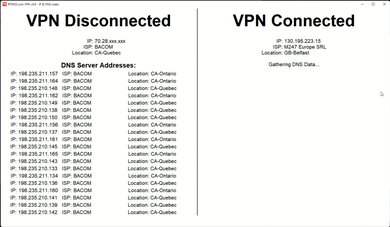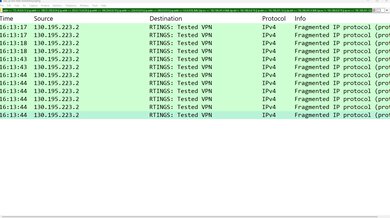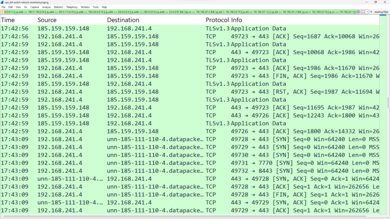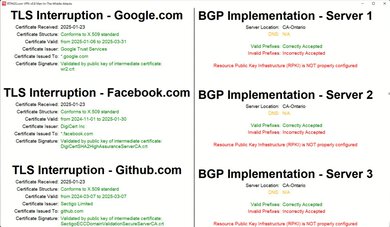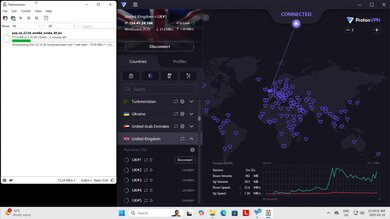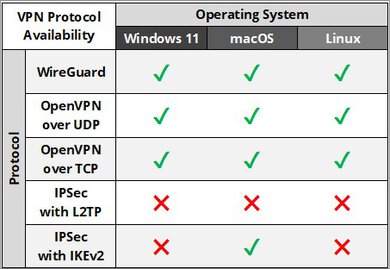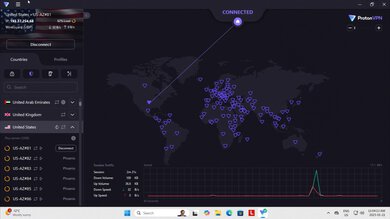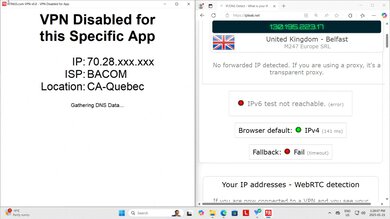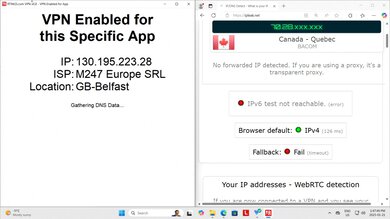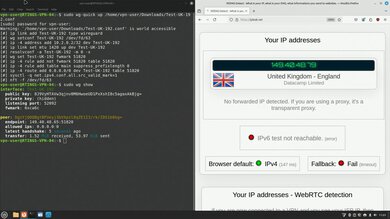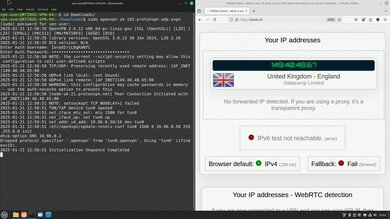Proton VPN is a VPN service that was launched in 2017. It's owned and operated by Proton AG, a Swiss company that also operates Proton Mail, the encrypted email service. Proton VPN has open-source applications on several different platforms, servers located in over 110 countries, and additional features like obfuscation, multi-hop, and DNS filtering.
Our Verdict
Proton VPN is great for torrenting. It lets you download torrents, has no data limit, and keeps your IP address and DNS queries inside the VPN tunnel, ensuring your traffic remains private. Its kill switch effectively blocks unencrypted traffic leaking from your device after a restart or software crash, too. That said, it lacks anonymity-preserving registration options, requiring an email address and password to create an account.
Accepts a variety of privacy-preserving payment options.
Proper TLS implementation doesn't leave you vulnerable to man-in-the-middle attacks.
Doesn't leak your IP address or DNS queries.
Kill switch works as intended.
No registration options that preserve anonymity.
Proton VPN has impressive security. It doesn't leak your IP address or DNS queries while you're connected to it, and it has proper TLS implementation, protecting you from man-in-the-middle attacks. Also, its kill switch works as intended, blocking unencrypted data leaking from your system in case of a reboot or reconnecting after a loss of internet.
Proper TLS implementation doesn't leave you vulnerable to man-in-the-middle attacks.
Doesn't leak your IP address or DNS queries.
Kill switch works as intended.
Proton VPN has fast download and upload speeds, so you can download files quickly with ample bandwidth for 4k video streaming. That said, it has poor latency performance, so it's unsuitable for latency-sensitive tasks like online gaming and won't feel responsive when using the internet in general.
Changelog
-
Updated Aug 27, 2025:
We've added a link to our newly published best VPNs for iPhone article in the Popular Comparisons section of the review.
-
Updated Aug 14, 2025:
We've added a link to an investigation we conducted between WireGuard and OpenVPN in the Protocols section of the review.
-
Updated May 14, 2025:
After converting this review to Test Bench 0.9.1, this VPN no longer fails the Kill Switch Robustness test. We've revised the text accordingly throughout the review.
- Updated May 14, 2025: We've converted this review to Test Bench 0.9.1. This redefines what we consider to be a leak.
Check Price
Differences Between Sizes And Variants
Proton VPN has a free tier and a paid Plus tier, which we bought and tested in this review. We also tested Proton VPN Free separately.
| Plan | Maximum Devices | Torrents (P2P) | Country Selection | Speed Throttling | Split Tunnelling |
|---|---|---|---|---|---|
| Free | 1 | No | No (5 available countries, fastest chosen automatically) | Yes | No |
| Plus | 10 | Yes | 117 | No | Yes |
It's also included in Proton Unlimited, a subscription with all of Proton's services.
Popular VPN Comparisons
Proton VPN is a solid choice that offers excellent security and features like multi-hop, obfuscation, support for port-forwarding, and servers located in over 110 countries. That said, it has higher latency than many other VPNs, which is a downside if you're concerned with gaming performance and general responsiveness.
To see which services we recommend, check out our articles on the best VPNs, the best VPNs for Windows PCs, or the best VPNs for iPhone.
Mullvad and Proton VPN are both good VPN services, but Mullvad is better. It does a better job of preserving your personal information, as you are assigned a randomly generated account number upon registration instead of being required to provide an email address. Mullvad also has clearer privacy policies that don't specify any sort of logging, compared to Proton's unclear and jargon-filled policies that indicate possible data collection. That said, Proton has a few more nice-to-have features, like servers in more countries, and you can connect up to 10 of your devices simultaneously.
NordVPN and Proton VPN excel in different areas. Proton has better security as it has a functional kill switch that blocks your internet connection if the VPN client crashes or your system restarts. On the other hand, Nord has significantly better latency, so it feels significantly snappier when browsing the web and performs better in latency-sensitive tasks. Otherwise, the two VPNs have very similar feature sets.
Test Results

We achieved these results with Proton's most strict kill switch option, 'permanent kill switch.' Without this setting enabled, Proton leaks some unencrypted calls to Windows servers after a system reboot.
Proton VPN delivers fast and consistent download speeds that are suitable for downloading files quickly and streaming 4k content.
Proton VPN has consistently fast upload speeds suitable for uploading files quickly, such as cloud backups.
Proton VPN has significantly worse latency performance than other VPNs. It's unsuitable for latency-sensitive applications like online gaming, can lead to issues in video calls, and generally feels less responsive when browsing the web.
This VPN has native Linux apps for Ubuntu, Debian, and Fedora GNOME desktop environments. Proton indicates that the app should work on most derivative distributions despite not being supported officially. You can also manually configure OpenVPN or WireGuard on Linux.
It's also available on a variety of different platforms, including iOS, Android, Chromebook, Android TV, Apple TV, Fire TV, and Chrome and Firefox extensions.
Stealth is a proprietary protocol that uses obfuscation to make your VPN traffic look like HTTPS traffic. This is useful if you're contending with internet censors that don't allow access to a site through a VPN.
If you want to learn about the performance differences between WireGuard and OpenVPN, check out our comparison.


